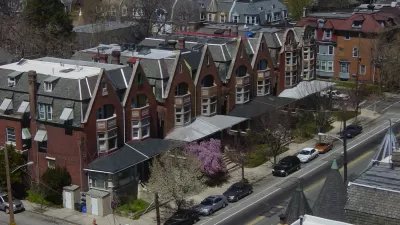In the aftermath of a battle around preservation of a Denver diner, local officials are considering changes to the city’s historic landmark law.

Denver city councilmember Kendra Black is developing proposed changes to the city’s landmark designation law. The changes would require more council member votes to pass designations opposed by property owners and, in historic districts, approval by a majority of landowners before an application is filed.
"Recently, the case of Tom’s Diner got national attention: A group of residents wanted to permanently preserve the building as a landmark, but owner Tom Messina wanted to sell the property for demolition and redevelopment," writes Andrew Kenney.
Kenney reports that, in a separate action, a working group has developed additional recommendations for changes to Denver’s landmark designation regulations. "As they consider the changes, city leaders will have to balance the value of historic buildings against the importance of new development and property owners’ rights," notes Kenney.
FULL STORY: After Tom’s Diner controversy, Denver leaders reconsider historic landmark law

Maui's Vacation Rental Debate Turns Ugly
Verbal attacks, misinformation campaigns and fistfights plague a high-stakes debate to convert thousands of vacation rentals into long-term housing.

Planetizen Federal Action Tracker
A weekly monitor of how Trump’s orders and actions are impacting planners and planning in America.

In Urban Planning, AI Prompting Could be the New Design Thinking
Creativity has long been key to great urban design. What if we see AI as our new creative partner?

King County Supportive Housing Program Offers Hope for Unhoused Residents
The county is taking a ‘Housing First’ approach that prioritizes getting people into housing, then offering wraparound supportive services.

Researchers Use AI to Get Clearer Picture of US Housing
Analysts are using artificial intelligence to supercharge their research by allowing them to comb through data faster. Though these AI tools can be error prone, they save time and housing researchers are optimistic about the future.

Making Shared Micromobility More Inclusive
Cities and shared mobility system operators can do more to include people with disabilities in planning and operations, per a new report.
Urban Design for Planners 1: Software Tools
This six-course series explores essential urban design concepts using open source software and equips planners with the tools they need to participate fully in the urban design process.
Planning for Universal Design
Learn the tools for implementing Universal Design in planning regulations.
planning NEXT
Appalachian Highlands Housing Partners
Mpact (founded as Rail~Volution)
City of Camden Redevelopment Agency
City of Astoria
City of Portland
City of Laramie




























